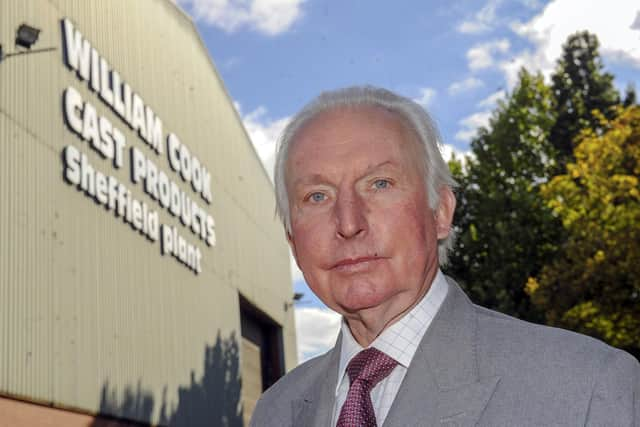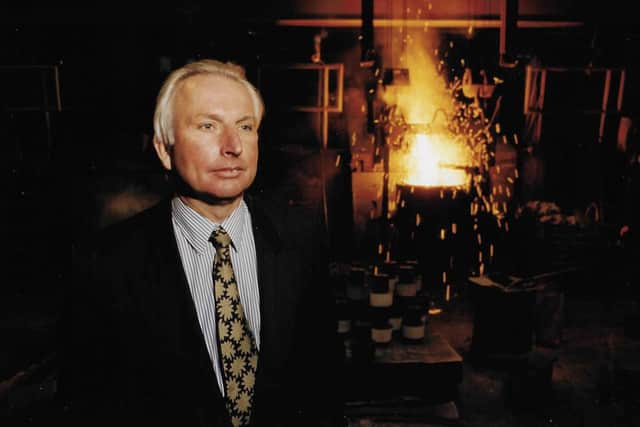Sir Andrew Cook on 1990s Sheffield steel takeover war: "It would have killed me if I had lost - literally"
This article contains affiliate links. We may earn a small commission on items purchased through this article, but that does not affect our editorial judgement.
When Sir Andrew Cook says he sees business as war, he means it.
Reflecting on the vicious fight to prevent his family steel company being lost to a hostile takeover bid - now the subject of gripping book Outcast: Cook Versus The City - Sir Andrew immediately reaches for a military analogy. Not only that, he says he believes that defeat would have been so crushing it would have resulted in his early death.
Advertisement
Hide AdAdvertisement
Hide AdSpeaking from Switzerland where he now lives, Sir Andrew explains: “Think about Wellington at Waterloo. Whilst you are fighting a battle, you don’t really think about it beyond parrying every blow that comes at you. The long-term objective is to win but to win you have got to fight every time they come at you with whatever you have got. Every time you face a broadside, you have got to respond. The bid fight was no different from that except it wasn’t live ammunition that was being fired at me, it was words and money. But what was at stake was still my life without a doubt. Afterwards I realised I was fighting for my life and it would have killed me if I had lost it. I mean that in a literal sense.”


He is revisiting a hostile takeover bid in the 1990s following the publication of Outcast, an authorised account that tells the story from Cook’s perspective. No hagiography, it includes a frank portrayal of his domineering personality and strained relationship with his father.
The family company had been casting steel since 1883 after being founded by Sir Andrew’s great-great grandfather and it was in late 1996 when Triplex Lloyd launched a takeover attempt - a move Cook took as a personal assault.
The offer valued William Cook at just under £58m. The personal attacks began immediately with Triplex Lloyd chief executive claiming William Cook shareholders were “suffering from their management’s loss of ambition and its failure to pursue new growth opportunities successfully”.
Advertisement
Hide AdAdvertisement
Hide AdThe initial feeling in the financial press and amongst City analysts was that the bid was likely to succeed. Questions were also raised about Cook’s autocratic management style in an era where corporate governance procedures were high on the agenda and greater oversight of company bosses, with new City codes of conduct introduced.


Cook had made his opposition to the codes public, believing they were “hasty and ill-considered” and made following regulations a higher priority than running a business effectively.
The tide started to turn when stock picker Terry Smith released research suggesting the company was worth double the Triplex offer. Triplex upped their offer to £72m but Cook had pulled together a larger £80m bid for a management buyout.
Cook says: “This was my life’s work and it risked being destroyed. “There are career chairmen who see their job as getting the best deal for shareholders but not putting their own money at stake. They’ll talk to the City and get another job afterwards.
Advertisement
Hide AdAdvertisement
Hide Ad“None of that psyche works with me. I knew it had to be me who got the best price. That was the only way of saving the whole thing by getting that down on the table.”


An increasingly bitter briefing war played out in the papers, with Cook facing a series of sleaze allegations, including the improper use of company funds to pay for a nanny and an all-expenses paid sailing holiday in the Caribbean.
Against the advice of his PR team, Cook faced the allegations by speaking to the media himself - admitting while there was some truth to what was being said, it was not the full story.
“They were more gross distortions or half-truths than complete lies. There were things about nannies being employed by the company and yachts and so on. We reimbursed the company with the full cost of any salary every month. The yacht thing was with two of my directors for what you might call a team bonding session.
Advertisement
Hide AdAdvertisement
Hide Ad“It was no big deal and I told the truth and it all fizzled out. I flew too close to the sun and I admitted that.”
What was described as a ‘Houdini act’ worked with Triplex ultimately walking away in February 1997 - allowing the Cook deal to go through.
But the victory came at a cost with Cook forced into having new owners who wanted their money back and a new board of directors to answer to. That summer, the Triplex Lloyd chief executive departed and in January 1998, the firm was sold itself to Doncasters Group for £200m.
But final victory came to Cook in 2004 when he succeeded in getting Electra Fleming to sell their stake back to him - returning the firm to full family control. That remains the ownership position to this day, with Cook still in post and son William a director.
Advertisement
Hide AdAdvertisement
Hide AdCook says: “That was the crowning achievement, that was worth waiting for and working towards.”
He says he still believes his approach to running a company is superior than other alternatives.
“If you believe business is a war, which I do, you have to have a Supreme Commander. The current mode is to have a split command, with a chairman and a chief executive, various committees and non-execs. But that hasn’t stopped some pretty spectacular frauds and collapses. The only thing it has stopped is those blokes going to jail.”
He says looking back on the battle today, it has even greater significance for him than it did at the time.
"That was the fight of my life without a doubt."
Outcast: Cook Versus The City by Bernard Ginns is available on Amazon.